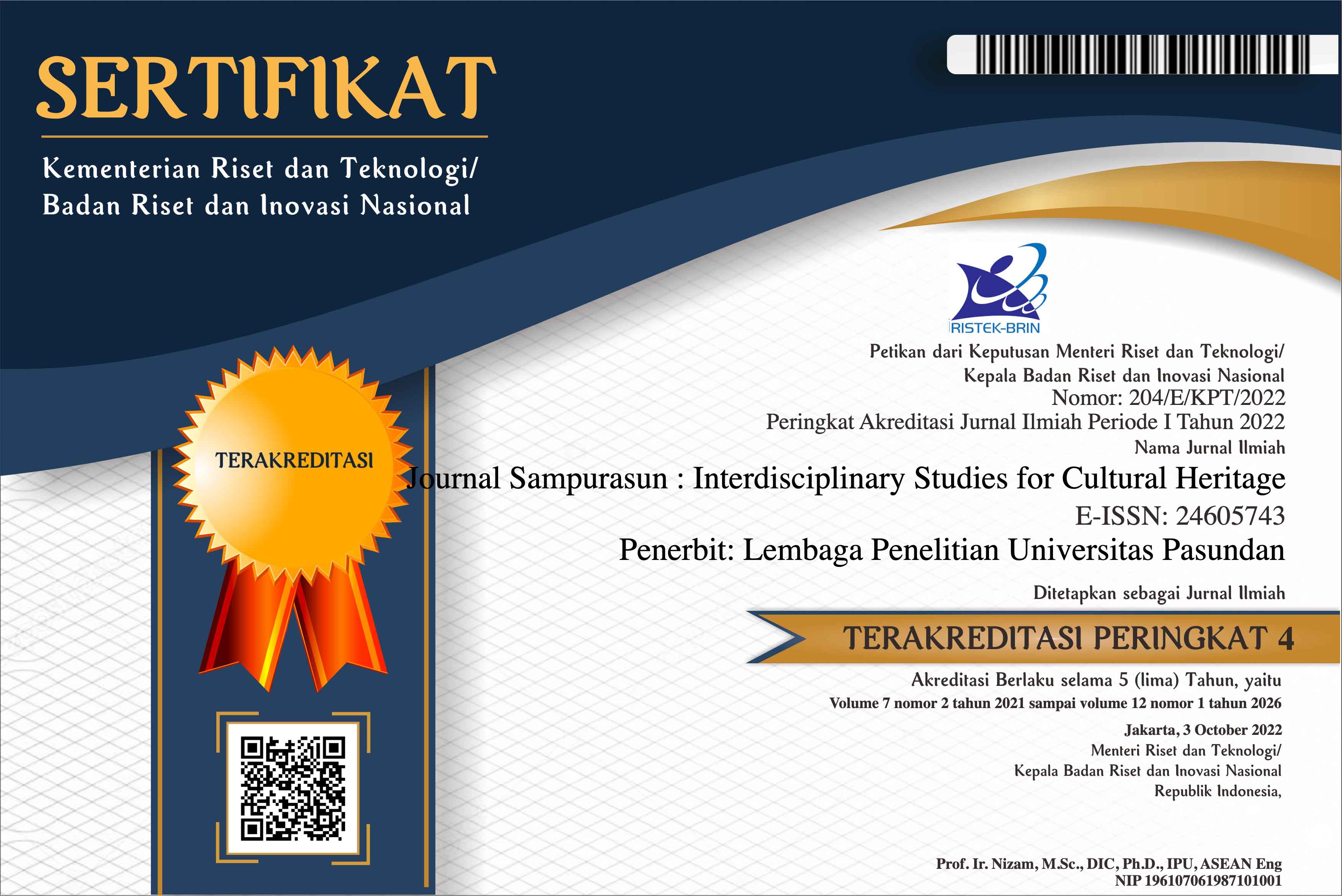Harmonization of Islam-Sunda in the Wuku Taun Tradition in Cikondang Village
DOI:
https://doi.org/10.23969/sampurasun.v9i2.9746Keywords:
Sundanese-Islamic culture, Cikondang traditional villageAbstract
In the case of Sundanese society and culture, many Sundanese classmates were born and raised in a Sundanese environment, but no longer recognize Sundanese culture, customs and values. They are more familiar with foreign cultures and civilizations. The new civilization has had a huge influence on culture and the state of society. The values that were previously believed were intimidated by the new values. On the one hand, positive things have given birth to knowledge for education, but on the other hand, Sundanese noble values have faded, because of the interests of immigrants.
The clash of values due to evolutionary faults made the Sundanese generation begin to shift. The values and social institutions that were originally considered as Sundanese identity and entities began to be doubted. They feel more valued as 'European humans' in their native form. Even though Sundanese has culture, has customs, has language, the Sundanese should be aware of their nature as Sundanese.
This change has also affected traditional Sundanese villages, which have been persistent in maintaining their traditions. The Sundanese people themselves are no longer familiar with the Traditional Village of Kampung Cikondang in the Bandung area, which so far has been used as a place for preserving Sundanese Customs and Culture.
For this reason, the role of all groups, the government, through policies that are more directed at cultural or cultural considerations rather than purely economic ones, are needed which are detrimental to a cultural development in the policies formulated, so that traditional enclaves such as Kampung Adat can eventually sustainable. While the community can play a role according to their respective abilities. The method used in this research is qualitative, that is
used as a research procedure that produces descriptive data in the form of
written or spoken words from observable persons.
Downloads
References
Ariyono Suyono, Dictionary of Anthropology. Jakarta: Academica Pressindo. 1985
Akip Prawira Suganda, Traditional Ceremonies in Pasundan. Bandung: Bandung Well. 1982 A.
Heuken SJ, Popular Encyclopedia of Pancasila Development. Kencana Dwi, Jakarta: Means of Sajati, 1988
Budhisantoso, Traditional Ceremony. Jakarta : Jarahnitra, 1983
Buddhiracana, Scientific Journal of History and Culture, Volume I Number 3. Bandung: BKSNT Bandung, 1997
Hasan Mustapa, Sundanese Customs. Bandung: Alumni, 1999
Koentjaraningrat, Mentality Culture and Development, Jakarta: Gramedia, 1984 148
M. Munandar Soelaiman, Transitional Society Dynamics. Mold-1. Yogyakarta: Student Library, 1998.
Wahyu Wibisana, "The Role of the Family in Cultivating Awareness of Cultural Values". Paper, Bandung, 1991
Yuzar Purnama, et al., Seleh Taun Mapag Taun: Review of Cultural Values, Bandung: Department of Education, 1999.
http://wisatadanbudaya.blogspot.com http://www.disparbud.jabarprov.go.id
Downloads
Published
Issue
Section
License
Copyright (c) 2023 Journal Sampurasun : Interdisciplinary Studies for Cultural Heritage

This work is licensed under a Creative Commons Attribution 4.0 International License.
Copyright Notice
Authors should not withdraw their submitted papers because the withdrawal wastes voluntary works devoted by an associate editor and reviewers. But, we accept the withdrawal of a submitted paper if authors have unavoidable reasons. In the event that a manuscript is to be withdrawn from submission to Sampurasun Journal, a letter must be sent to the editorial office requesting withdrawal by e-mail (sampurasunjournal@unpas.ac.id) with its scanned PDF file, before the notification of acceptance for publication.
The withdraw request letter must include the following information. Paper ID, Paper title, Authors names, Reason why the paper must be withdrawn, and Date and signatures of all the authors (or signature of the contact author).
If only the contact author signs the letter, he/she must obtain the agreement of the withdrawal from all the other authors and the letter must include the description that all the other authors agreed the withdrawal. The journal will not withdraw a manuscript from peer review until such a letter has been received. Authors must not assume their manuscript has been withdrawn until they have received appropriate notification from the editorial office. Withdrawal of a manuscript subsequent to acceptance for publication will only be granted in the most exceptional of circumstances.
After the paper is accepted for publication, the withdrawal is not permitted in principle. The authors must always pay the charge even if the withdrawal is permitted. Any request of withdrawal that does not follow the above procedure is treated as invalid. If illegal submission, e.g., plagiarized or duplicate submission, is found for a paper, the withdrawal of the paper will never be permitted and the authors will be punished based on the rule. It is not acceptable practice to withdraw a manuscript in the event of acceptance at another journal. This constitutes dual submission. The editorial office of the other journal will be notified of your actions. In such circumstances Sampurasun ISCH may chose to impose appropriate punitive action subject.
Withdrawal Penalty
Author is not allowed to withdraw submitted manuscripts, because the withdrawal is waste of valuable resources that editors and referees spent a great deal of time processing submitted manuscript, money and works invested by the publisher. If author still requests withdrawal of his/her manuscript when the manuscript is still in the peer-reviewing process, author will be punished with paying $200 per manuscript, as withdrawal penalty to the publisher. However, it is unethical to withdraw a submitted manuscript from one journal if accepted by another journal. The withdrawal of manuscript after the manuscript is accepted for publication, author will be punished by paying US$500 per manuscript. Withdrawal of manuscript is only allowed after withdrawal penalty has been fully paid to the Publisher. If author don't agree to pay the penalty, the author and his/her affiliation will be blacklisted for publication in this journal. Even, his/her previously published articles will be removed from our online system.


















